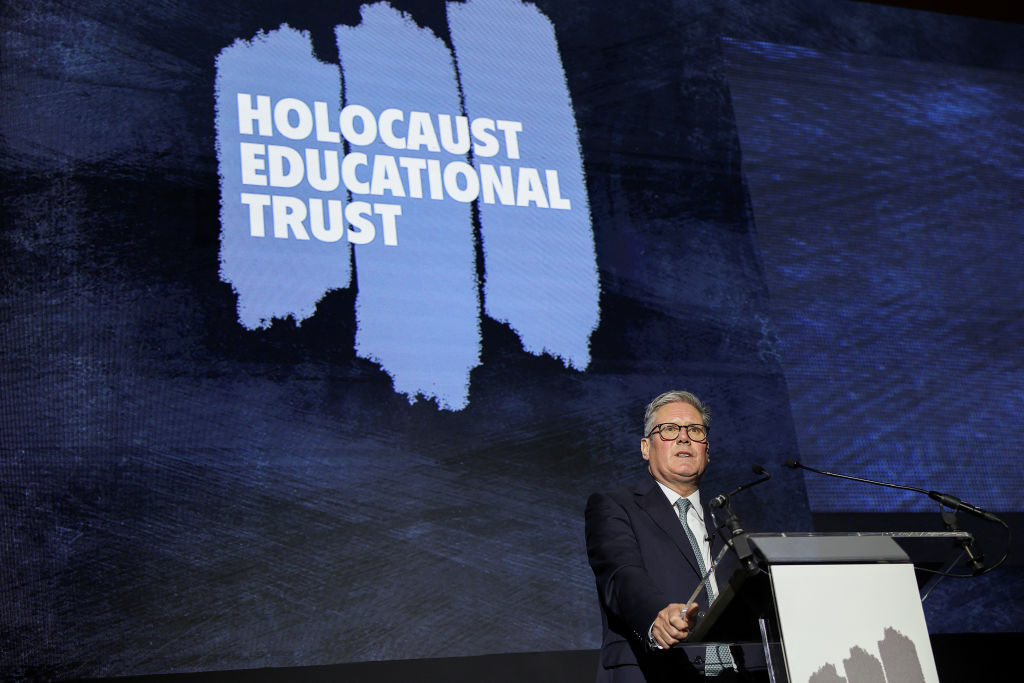On 27 January next year, the world will commemorate the 80th anniversary of the liberation of Auschwitz. ‘The commemoration will be the last of its kind’, says Michael Bornstein who, having hidden for six months in his mother’s bunk, aged only four, was among the youngest survivors.
What lies ahead regarding Holocaust memory – and anti-Semitism – when Michael Bornstein is no longer with us? Lily Ebert’s death last week week feels like an important moment: the most famous Holocaust survivor, at least to the TikTok generation, is also now gone. So far, Britain has met this historical moment in bizarre ways. The D-Day anniversary that Rishi Sunak left a few months ago was the last time such an event would occur with living veterans present.
A few weeks ago, Sir Keir Starmer set out his muddled vision for Holocaust memorialisation in a speech at the Holocaust Educational Trust. It was not mere politics for him, but something deeper. His Holocaust education as a schoolboy was significant in his formation: he recalled how, when a Holocaust survivor came to visit his school, his boisterous classmates ‘fell silent, totally silent and still’. He declared with utter certainty that improvements to Holocaust education would help to combat anti-Semitism – that a renewed emphasis on Holocaust education could provide the antidote to ‘hatred marching on our streets, the pulse of fear beating in this community’.
Such claims are naïve in the extreme. The Prime Minister insisted that the Holocaust will remain on the curriculum ‘come what may’, and committed to closing the loopholes that currently allow some schools to get away with not teaching it. But, as he conceded, the Holocaust is already on the curriculum: and this has done nothing to arrest ‘record levels of anti-Semitism’. Indeed, it is easy to imagine it having the exact opposite effect, breeding a certain resentment towards Jews for appearing to get a special, enshrined status in the curriculum. All this is further inflamed, of course, by the ongoing war in the Middle East, where parallels with the Holocaust are never too far away. The most popular reply to Sir Keir’s tweet about his speech, with 16,000 likes, reads ‘“We will make sure the Holocaust is never again repeated” – Man Supporting Another Holocaust’.
In his speech, Sir Keir wholeheartedly endorsed the ‘Testimony360’ programme, which uses VR technology to allow students not only to hear Holocaust survivors but ‘interact’ with them too. He hopes this will ensure that ‘the message of Britain’s Holocaust survivors will echo eternally across the generations’. VR may have a part to play in the future of education, and it is good that survivor testimony is still being collated before it is lost forever. But they may be trying to execute an impossible task. Time does pass, and historical events do become more remote and less relevant to us with its passage. Even the Holocaust, the most egregious crime in history, is no exception: it is not beyond the natural passage of time or the fading of memory.
Sir Keir capped off his speech with a puzzling line: ‘For the first time, studying the Holocaust… will become a critical, vital part of every single student’s identity’. It probably isn’t the place of the national curriculum to dictate to pupils their ‘identities’; nor is it clear to me what this would look like in practice. Such a sentiment springs from a worldview that ‘education’ is a panacea; it is a worldview that insists that the cure for all social ills is ‘training courses’ and ‘workshops’.
It is a worldview that insists that the cure for all social ills is ‘training courses’ and ‘workshops’
The physical manifestation of this sentiment will be the Holocaust Memorial and Learning Centre in Victoria Tower Gardens, right next to parliament. Part of Sir Keir’s speech was devoted to a defence of this controversial project: the Centre will be built ‘boldly, proudly, unapologetically; not as a Jewish community initiative, but as a national initiative’. One of its most dogged supporters is Robert Jenrick, for whom, incidentally, Dov Forman, Lily Ebert’s great-grandson and TikTok co-star, is a senior researcher. The Centre is borne of the same deep anxiety as Sir Keir’s speech ‘Testimony360’: ‘every day that passes’, say its proponents Ed Balls and Eric, Lord Pickles, ‘means fewer Holocaust survivors will be around’. That it will be so close to parliament is no accident. Just as Sir Keir hopes that the Holocaust will be a ‘vital part of every student’s identity’, Balls and Lord Pickles hope that the Centre, in its location, ‘will remind all of us, and future citizens, that the Holocaust is central to our own history and society’. It is as though, anxious about the passage of time, these figures are going into overdrive to assert the importance of the Holocaust to modern Britain. Rather than being an event in which Britain was largely offstage, now it is presented as a foundational moment in our own national story.
I spent much of the summer in Rome. Every morning, I walked along a street that was once home to a large Jewish community. I stepped over at least a dozen Stolpersteine, small plaques bearing the names of Holocaust victims outside the homes they were torn away from. Sometimes I skipped over them in a hurry, late for my lesson; other times I stopped for a while, muttering their names in tantric concentration, trying to commit them to memory. These stones, I think, will be the most poignant and enduring Holocaust memorials. That they are unobtrusive is part of the point.







Comments